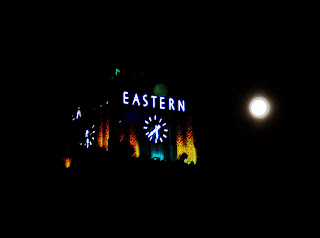Traveling farther...

I look at the moon nestled in a bed of stars, floating out there calmly passing through the night sky and I think, “I will never go there”. But I do think of where I have been and what I have seen and I believe that if laid out, end-to-end, all of them would probably reach that illuminated orb. We all, regardless of the physical miles, have traveled so far in our lives that a conventional map would not adequately translate the twists and turns, the peaks and valleys and of course the lost roads and dead ends. But when we stand, stalled not seeing the next step from these dead ends, we need to take a moment, breathe and allow the vista to unfold that hidden road and soon you will be on your way. Maybe to the moon.
clepe • \KLEP\ • verb
: to name or to call
Example Sentence:
The Maxwells' boat was a beautiful old wooden sloop, yclept "True Love."
Did you know?
"Clepe" itself is a word that is considered archaic and nearly obsolete, but its past participle "yclept" (pronounced ih-KLEPT) continues to be used, albeit rarely. In Old English, the prefix "ge-" denoted the completion or result of an action; in Middle English, the prefix shifted to "y-" and appeared in words such as "ybaptised" and "yoccupied." Eventually, all the "y-" words except "yclept" fell into disuse. One reason that "yclept" persists may be that it provides a touch of playfulness that appeals to some writers. Another may be that although "yclept" is an unfamiliar term to most people, its meaning can usually be inferred from context. Whatever the reason, "yclept" continues to turn up occasionally in current publications despite its strange and antiquated look.
![]()


No Comment
Post a Comment